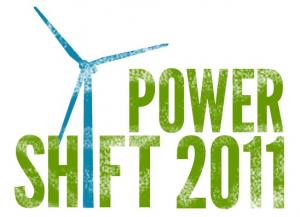This weekend in Washington DC, thousands will descend upon the Walter E. Washington Convention Center for Power Shift 2011. A veritable boot camp of movement building, it will bring together the leaders of the so-called “youth” movement to converge on finding solutions to effectively fight climate change, ensure a clean energy future, and finally displace the entrenched dirty energy industries.
The jam-packed agenda includes keynote addresses from Al Gore, Bill McKibben, and EPA administrator Lisa Jackson along with a plethora of workshops, meetings, and trainings planned from morning until night each day of the conference, culminating in a day of action on Monday the 18th in which attendees will take direct action against major polluters and also participate in citizen visits to Congressional offices.
With climate threats posed by hydrofracking and unconventional gas production booming across the US, the Canadian tar sands and dangerous proposed pipelines, and the coal and oil industries stubbornly fighting to keep their dirty energy subsidies, we definitely have our work cut out for us.
Yet something has always bothered me about the “youth” label so frequently applied to this movement by the media. I remember the first time I heard it when I was working with several groups at the COP15 summit in Copenhagen, and a few friends were telling me about the youth delegations attending the conference. I thought, what a smart and provocative idea to bring a bunch of little kids and tweens along to show exactly whose futures we are sacrificing if we do not reach any meaningful, science-based and binding agreements. However, I was dismayed to learn that the “youth” delegation was actually comprised of mostly 20-somethings and college students – in other words, people from my generation. Suddenly I felt like I was sitting back at the kiddie table at Thanksgiving.
While it is true a few of my generation are sparking a new subset of psychological rules in life milestones, branding us as “youth” diminishes the importance of our goals and undercuts the leverage we need to get our message across in the struggle to enact change from all sides of this momentous challenge. The average age of a member of the 112th Congress is approximately 57 years, leaving a minimum 25-year age gap. While the age-old adage of “respect your elders” is a fine social construct, sometimes it is frustrating when your elders are swayed more by what’s being placed in their pockets and campaign coffers instead of the science-based messages being placed in front of them.
There are many people in my age range working to solve climate change and combat dirty energy in diverse and powerful ways. They work as journalists, offering smart and insightful views of policy and science. They work in urban sustainability, attempting to make our cities more livable with less impact and waste. They work locally in communities across the globe enabling people to become more resilient against future climate impacts. They work to fight for a better future through acts of nonviolent civil disobedience. They receive distinguished titles and work in Federal service. While pragmatism is a key priority, we “less-aged” folks also leave room to envision a more ideal, fairer world.
Today in an article on Power Shift by the Washington Post, some view these demands for climate justice and a clean energy future as “unrealistic” just based on the political hurdles that would need to be surpassed to reach those goals. The first step is not accepting the deal currently on the table if it’s not going to do anything that’s going to solve the problem. President Obama has disappointed many in the last few years with his continual kowtowing to oil and gas industries. This year at Power Shift, the organizers are not giving him any praise this time around. Co-director of Power Shift 2011, Courtney Hight was quoted as saying,
“We want to make sure the president is seeing that we’re done with this. We need them to draw a line in the sand. We need him to stand up to the polluters.”
We want our leaders to understand that we are not just some kids with paint brushes working on some elaborate art project and aimlessly waving signs and banners in the air. It seems like the “youth” branding leaves us with this connotation that the “real adults” are the ones actually equipped to make the important decisions. If anything, our generation’s voice is just as – if not more – important, since it is our future that is being decided (or sentenced, depending on how you look at it).
We have daunting obstacles in front of us, including decision-makers who don’t even believe in the science of climate change or feel it’s not important enough to act on. Then there are those who have the mentality that they won’t be around to see the fallout of our current decisions, so why bother. Well, we “youth” don’t want to be handed an ecologically devastated planet when we grow older – we want to fix it now.
Our generation will not be underestimated. Our abilities will not be discounted. And we definitely will not sit quietly and let our potential futures and the planet get flushed down the drain just to enable a comfortable joy ride for the elders.
I fought hard to graduate from the kiddie table at Thanksgiving as I grew older, and my peers and I will fight just as hard to not be placed at the kiddie negotiating table.
Follow me at the conference this weekend on Twitter @Laurel350.
Subscribe to our newsletter
Stay up to date with DeSmog news and alerts






